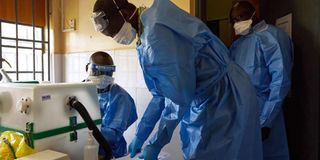Premium
Covid-19: South Sudan weighs costs of keeping schools shut

What you need to know:
- The country closed public schools three months ago to fight the pandemic that has infected 2322 people and killed 46 so far.
- Officials insist schools will remain closed indefinitely yet details came forth of a possible mental and physical toll on children staying at home.
- South Sudan’s primary school enrolment rate dropped from 90 in 2011 to 72.9 in 2015, according to the World Bank.
Juba,
Authorities in South Sudan are facing the dilemma of whether to keep schools shut in the fight against Covid-19 or re-open them and save children from continual child labour.
The country closed public schools three months ago to fight the pandemic that has infected 2322 people and killed 46 so far.
The country’s recovery rate has been encouraging, with 1,776 cases reported cured from the virus, according to the Ministry of Health.
Officials insist schools will remain closed indefinitely yet details came forth of a possible mental and physical toll on children staying at home.
In a webinar organised by UK charity group Save the Children, discussants said children have faced early pregnancies, child labour as well as other mental torture.
Rama Hansraj, Save the Children Country Director for South Sudan, said the continuous closure of schools due to Covid-19 could also be punishing as many as 2.2 million children who will face a “gap” in education.
“Within this period of Covid-19 and when schools re-open, Save the Children calls for the protection of all children from abuse, exploitation, gender-based violence and neglect,” he said.
“This is especially girls and the most marginalised, including but not limited to children outside of family care and in schools, children with disabilities and connected children.”
LOW ENROLMENT
South Sudan’s primary school enrolment rate dropped from 90 in 2011 to 72.9 in 2015, according to the World Bank.
Though data doesn’t show the percentage of school attendance per day or month, Covid-19 likely added woes to a country that rights watchdogs say has child soldiers used by rebel groups.
A 2018 report by Unesco suggested that at least 45.6 per cent of children aged below 14 in South Sudan work as gardeners, miners, child soldiers, herders, quarry rock breakers, street vendors, home cleaners or even brick makers.
Just 31.5 per cent are attending school, according to the report.
NEGLECT
In general, South Sudan had a primary school completion rate of 25 per cent, one of the lowest in Africa.
At the Save the Children webinar, children themselves told the audience they had felt neglected during the pandemic.
“The coronavirus is affecting us when out of school. Many girls have been impregnated and some boys have lost their lives, so we are asking the government, let them [remove] the lockdown for us to start our schools”, said Aman, who studies in Juba.
Ayak, a 16-year-old Primary 8 candidate at Flag Primary School in Juba says Covid-19 has affected her education.
“I am unable to have lessons since schools were closed and I am not even sure whether I will finish my final exams this year. A year will be wasted if I don’t,” she said.
This week, Eastern Equatoria State authorities said the redundancy caused by the Covid-19 lockdown has left over 125 teenage girls pregnant since the emergence of the virus in South Sudan.
In May, the Ministry of General Education and Instructions reported 23 cases of teenage pregnancies in Western Equatoria State.
REVIEW
Save the Children, Unicef and Unesco released a press statement last week calling on the government of South Sudan to review Covid-19 measures on the closure of schools.
“There is overwhelming evidence on the negative impact of school closures on children’s physical and mental health, nutrition, safety and learning. When children are out of school for prolonged periods of time, their exposure to physical, emotional and sexual violence increases,” stated a joint statement by Dr Mohamed Ayoya, the Unicef Representative in South Sudan, and Mr Julius Banda, the Unesco Representative in South Sudan.
“Their mental health deteriorates. They are more vulnerable to child labor and less likely to break out of the cycle of poverty.”
Dr Loi Thou, the spokesperson of South Sudan’s Ministry of Health, says the re-opening of schools depends on infection numbers.
“The tricky part is that our schools lack proper infrastructure and the capacity of classes is low. This will require a lot of work and makes it very difficult to think of applying education mechanisms applied in different countries,” Dr Thou said.
“We will keep monitoring the cases. If cases decrease, we may think of re-opening schools.”
GOVERNMENT’S VIEW
But Kuyok Abol, the Undersecretary at the Ministry of Education, says the government will not reopen schools anytime soon.
“We expect a spike in cases of the disease in the coming weeks. In such a situation we cannot re-open schools. Secondly, there is no country in the region that is now reopening [schools].
“In this particular time, I think what we need is we need to keep our children safe, we need to keep our communities safe” said Kuyok.
Various South Sudanese health experts have recommended that schools remain closed due to the higher risk brought on by physical meetings.
Dr Gasim Omer, an epidemiologist at South Sudan doctors’ union, said it wouldn’t make “medical sense” to re-open schools when cases are rising.
“If we open schools, those who are positive and asymptomatic will transfer the virus to those who are not infected, who will then take the virus to their homes,” Dr Omer said.
“At this stage, we don’t need to rush to open schools but to strengthen measures to combat Covid-19 and make learning easy for children at home.”





